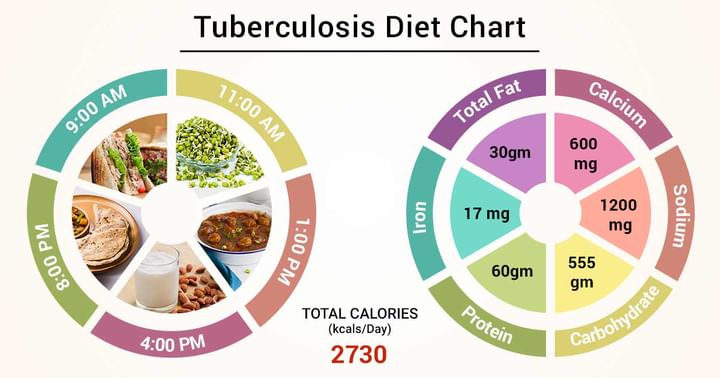Get the App
For Doctors
Login/Sign-up
About
Health Feed
Find Doctors
Diet Chart For tuberculosis
Last Updated: Jan 20, 2025
About
People who are somewhere close to malnourishment are easily vulnerable to tuberculosis due to decreased resistance and also stand the risk of getting infection or relapsed tuberculosis despite treatment.
A healthy diet can help pace up the process of recovery and have a long term impact:
- It is advisable to increase intake of vitamin B through leafy, dark greens like kale and spinach.
- Also, plenty of whole grain cereals through bread, etc. Are to be taken.
- Also it is difficult for the body at this stage to digest saturated fats.
- Therefore unsaturated fats like olive oil is recommended.
- Hink of buying a fruit based with fruits of all colors.
- Include bright colored ones like tomatoes, cherries and blueberries.
Healthy diet does not stop just with what to include, It also speaks about what not to include these are:
- Refined products like sugar, white bread, white rice, ect.
- Skip tobacco
- Refrain from alcohol
- Caffeine is to be kept in controlled limits.
Diet Chart
| Sunday | |
| Breakfast (8:00-8:30AM) | cottage Cheese sandwich(2 slice bread) + 1 cup skimmed milk. |
| Mid-Meal (11:00-11:30AM) | 1 cup boiled green gram sprouts |
| Lunch (2:00-2:30PM) | Veg pulav rice 1 cup+ 1 cup Soy Chunk curry |
| Evening (4:00-4:30PM) | 1 cup Almond milk |
| Dinner (8:00-8:30PM) | 2 chapati + Lady's finger sabji 1 cup |
| Monday | |
| Breakfast (8:00-8:30AM) | chapati-3+ Paneer sabji 1 cup |
| Mid-Meal (11:00-11:30AM) | 1 cup grilled vegetables with Cottage cheese. |
| Lunch (2:00-2:30PM) | 2 Roti+ Mushroom curry 1 cup + 1 cup moong dal |
| Evening (4:00-4:30PM) | 1 apple + 1/2 cup cottage cheese |
| Dinner (8:00-8:30PM) | 2 chapati + arhar dal 1 cup |
| Tuesday | |
| Breakfast (8:00-8:30AM) | Soy flour Uthappam 2 + coconut chutney + 1 glass skim milk. |
| Mid-Meal (11:00-11:30AM) | 1 cup boiled black chana |
| Lunch (2:00-2:30PM) | 1 cup rice + Kidney beans curry 1 cup + cucumber salad+ cottage cheese vegetable 1 cup. |
| Evening (4:00-4:30PM) | Brown rice flakes poha with nuts 1 cup |
| Dinner (8:00-8:30PM) | 2 paneer stuffed capsicum +2 chapati |
| Wednesday | |
| Breakfast (8:00-8:30AM) | Paneer Paratha 2+ 1 cup skim milk |
| Mid-Meal (11:00-11:30AM) | 1 cup grilled paneer |
| Lunch (2:00-2:30PM) | 2 chapati + Black eyed beans curry 1 cup + cucumber salad |
| Evening (4:00-4:30PM) | 1 cup soy milk |
| Dinner (8:00-8:30PM) | Broken wheat upma 1 cup+ 1/2 cup green beans sabji |
| Thursday | |
| Breakfast (8:00-8:30AM) | Mushroom Paratha 2 +1 cup skim milk |
| Mid-Meal (11:00-11:30AM) | 1 cup boiled green gram sprouts |
| Lunch (2:00-2:30PM) | 1/2 cup rice + 1-2 chappati + Chickpeas spinach curry 1/2 cup + Snake gourd sabji 1/2 cup |
| Evening (4:00-4:30PM) | 1 cup boiled channa |
| Dinner (8:00-8:30PM) | 2 chapati+ 1 cup mix veg curry |
| Friday | |
| Breakfast (8:00-8:30AM) | Moong dal cheela with paneer filling- 2 + 1 cup skim milk |
| Mid-Meal (11:00-11:30AM) | 1 cup boiled black chana |
| Lunch (2:00-2:30PM) | 1 cup rice+ Soy chunk curry1/2 cup+ Lady's finger sabji 1/2 cup |
| Evening (4:00-4:30PM) | 1 glass almond milk |
| Dinner (8:00-8:30PM) | 2 chapati+Ridge gourd sabji 1 cup |
| Saturday | |
| Breakfast (8:00-8:30AM) | Wheat dosa-2 + Tofu curry 1 cup |
| Mid-Meal (11:00-11:30AM) | 1 cup grilled vegetables with Cottage cheese. |
| Lunch (2:00-2:30PM) | 1/2 cup rice+ 1-2 chapati + Kidney beans curry 1/2 cup + Palak paneer sabji 1/2 cup |
| Evening (4:00-4:30PM) | 1 cup boiled black eye beans |
| Dinner (8:00-8:30PM) | Broken wheat upma 1 cup+ 1/2 cup green beans sabji |
Food Items To Limit
- Greasy Foods : Greasy foods, such as fried beef and chicken, bacon, french fries and onion rings, contribute hefty amounts of saturated fat -- fats associated with high cholesterol and increased risk for diabetes and heart disease.
- Trans-Fatty Acids : Trans-fatty acids, or trans fats, are fats created through a process in which hydrogen is added to vegetable oil. To avoid these unhealthy fats, avoid margarine; shortening; commercially prepared cookies, cakes, pastries and crackers; and all foods that list partially hydrogenated vegetable oil as an ingredient.
- Refined Carbohydrates : Common sources of refined carbohydrates include enriched breads, cereals, pasta and baked goods; instant rice; and foods and beverages rich in added sugars, such as regular soft drinks, candy, sorbet, frosting, pancake syrup, jam and jelly.
- Caffeine and Alcohol : Excessive caffeine or alcohol consumption may also have a diuretic, or fluid-flushing, effect and prevent you from consuming healthier beverages, such as water, low-fat milk or pure juices.
Do's And Dont's
Do's & Dont's
- Eat protein-rich foods: A diet rich in protein can contribute to strengthening your immune system. So load up on eggs. If you are a vegetarian, loading up on jowar, bajra and nachni can provide you with the necessary protein.
- Get enough micronutrients: Micronutrients like vitamins A, E and D3 are particularly important for a healthy immune system. Seafood is rich source of vitamin D.
- Load up on antioxidant-rich foods: Vitamins A, C and E are antioxidants that destroy harmful oxygen molecules called free radicals and protect the body. Eat lots of antioxidant-rich foods.
- It is also best to avoid refined carbohydrates such as flour and sugar as they provide empty calories devoid of nutrients. Enriched bread, cereals and pasta are common sources of refined carbohydrates.
- Fried foods contain hefty amounts of saturated fats that exacerbate symptoms associated with tuberculosis such as diarrhoea and abdominal cramping and fatigue.
- Eliminate trans fatty acids from your diet to reduce the symptoms of the disease. So avoid margarine, commercially prepared cakes, pastries and cookies and every food that lists partially hydrogenated vegetable as an ingredient.
Food Items You Can Easily Consume
- Calorie dense foods : Calorie dense foods include banana, cereal porridge or kheer, rava or sooji kesaribhath or a halwa, peanut chikki, rava laddoo, wheat and ragi sprouted malt porridge or drink, khichdi and so on.
- Protein rich foods : Increased protein needs are met by including groundnut, gingelly chikki or laddoo, or dry fruit and nut mixes. Eggs, paneer ,tofu, soya chunks are other protein rich foods that are easily absorbed as well.
- Vitamin A, E, C : Some of the best foods for TB patients include the yellow orange fruits and vegetables such as orange, mango, papaya, sweet pumpkin, carrots which are rich in Vitamin A, while Vitamin C is obtained from fresh fruits including guava, amla, orange, tomato, sweet lime, lemon, capsicum. Vitamin E is usually found in wheat germ, nuts, seeds and vegetable oils.
- B complex vitamins: Most B complex vitamins are found in whole grain cereals and pulses, nuts and seeds. For non-vegetarians, B complex can be obtained from eggs, fish, especially sea fish like salmon, tuna, mackerel, sardines, chicken and lean cuts of meat.
- Selenium and zinc: Mushrooms and most nuts and seeds including sunflower seeds, chia seeds, pumpkin seeds, sesame, flax are also good sources of both selenium and zinc. Non vegetarian options include oysters, fish and chicken.
References
- Wilbur AK, Farnbach AW, Knudson KJ, Buikstra JE, Arriaza B, Blom D, Mitchell PD, Pechenkina EA, Pfeiffer S, Tayles N, Littleton J. Diet, tuberculosis, and the paleopathological record. Current Anthropology. 2008 Dec;49(6):963-91.
- Leitch I, WESTWATER J, KEERS R, RITCHIE J, CHALMERS C. Diet and Tuberculosis. Proceedings of the Nutrition Society. 1945;3:155-94.
- Pottenger Jr FM, Pottenger FM. Adequate diet in tuberculosis. American review of tuberculosis. 1946 Sep;54(3):213-8.
Book appointment with:
Delhi
Mumbai
Chennai
Bangalore
Index
Table of content
Content Details
Written ByDrx Hina FirdousPhD (Pharmacology) Pursuing, M.Pharma (Pharmacology), B.Pharma - Certificate in Nutrition and Child CarePharmacology
Reviewed By
Find Dietitian/Nutritionist near me
Ask a free question
Get FREE multiple opinions from Doctors
posted anonymously



